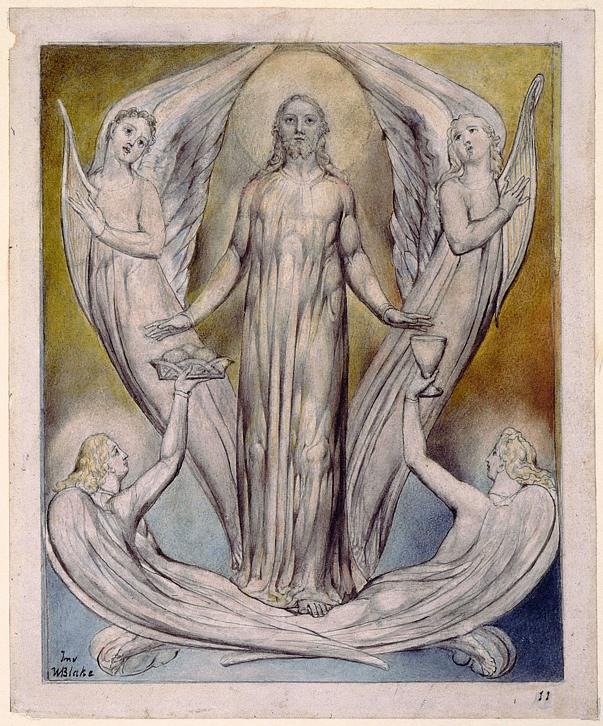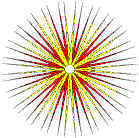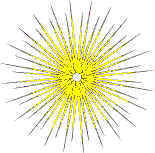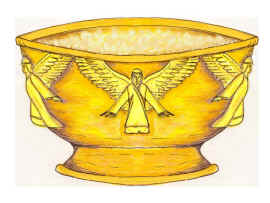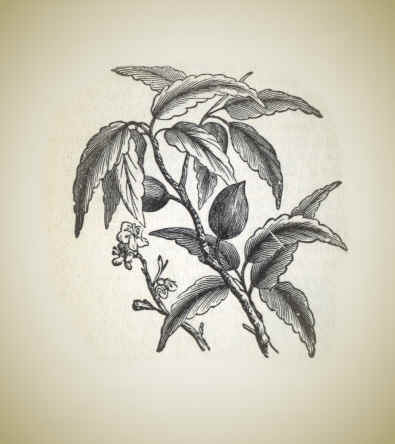Friday, October 28, 2011
All the Thel Pics
These pictures came from the Digital Collections of the Library of Congress.The url is http://lcweb2.loc.gov/cgi-bin/ampage?collId=rbc3&fileName=rbc0001_2003rosen1798Apage.db&recNum=0
Blake's first large poem (not so large) was Thel. It consisted of 6 Plates with two
introductory pictures (called in Erdman's Illuminated Blake Plates i and ii:
Much can be said about all of them
 This is Plate i:
This is Plate i:"Does the Eagle know what is in the pit?
or wilt thou go ask the Mole:
Can Wisdom be put in a silver rod?
or Love in a golden bowl?"
 This is Plate ii:
This is Plate ii:The Book of Thel
Blow this up and you'll see some interesting figures.
There's a figure within the second O; Erdman says it's
a shepherd with a crook like Thel's.
Plate 1:

PLATE 1 THEL
I The daughters of Mne Seraphim led round their sunny flocks.PLATE 2 Why should the mistress of the vales of Har, utter a sigh.
All but the youngest; she in paleness sought the secret air.
To fade away like morning beauty from her mortal day:
Down by the river of Adona her soft voice is heard:
And thus her gentle lamentation falls like morning dew.
O life of this our spring! why fades the lotus of the water?
Why fade these children of the spring? born but to smile & fall.
Ah! Thel is like a watry bow. and like a parting cloud.
Like a reflection in a glass. like shadows in the water.
Like dreams of infants. like a smile upon an infants face,
Like the doves voice, like transient day, like music in the air;
Ah! gentle may I lay me down, and gentle rest my head.
And gentle sleep the sleep of death. and gentle hear the voice
Of him that walketh in the garden in the evening time.
The Lilly of the valley breathing in the humble grass
Answer'd the lovely maid and said; I am a watry weed,
nd I am very small, and love to dwell in lowly vales;
So weak, the gilded butterfly scarce perches on my head.
Yet I am visited from heaven and he that smiles on all.
Walks in the valley. and each morn over me spreads his hand
Saying, rejoice thou humble grass, thou new-born lilly flower,
Thou gentle maid of silent valleys. and of modest brooks;
For thou shalt be clothed in light, and fed with morning manna:
Till summers heat melts thee beside the fountains and the springs
To flourish in eternal vales: then why should Thel complain,
Plate 2
She ceasd & smild in tears, then sat down in her silver shrine.
Thel answerd. O thou little virgin of the peaceful valley.
Giving to those that cannot crave, the voiceless, the o'ertired.
Thy breath doth nourish the innocent lamb, he smells thy milky
garments,He crops thy flowers. while thou sittest smiling in his face,
Wiping his mild and meekin mouth from all contagious taints.
Thy wine doth purify the golden honey, thy perfume,
Which thou dost scatter on every little blade of grass that springs
Revives the milked cow, & tames the fire-breathing steed.
But Thel is like a faint cloud kindled at the rising sun:
I vanish from my pearly throne, and who shall find my place.
Queen of the vales the Lilly answerd, ask the tender cloud,
And it shall tell thee why it glitters in the morning sky,
And why it scatters its bright beauty thro' the humid air.
Descend O little cloud & hover before the eyes of Thel.
The Cloud descended, and the Lilly bowd her modest head:
And went to mind her numerous charge among the verdant grass.
Plate 3:

Plate IV:
PLATE 4 Then Thel astonish'd view'd the Worm upon its dewy bed.Plate 5:
Art thou a Worm? image of weakness. art thou but a Worm?
I see thee like an infant wrapped in the Lillys leaf:
Ah weep not little voice, thou can'st not speak. but thou can'st weep;
Is this a Worm? I see thee lay helpless & naked: weeping,
And none to answer, none to cherish thee with mothers smiles.
The Clod of Clay heard the Worms voice, & raisd her pitying head;
She bowd over the weeping infant, and her life exhal'd
n milky fondness, then on Thel she fix'd her humble eyes.
O beauty of the vales of Har. we live not for ourselves,
Thou seest me the meanest thing, and so I am indeed;
My bosom of itself is cold. and of itself is dark,

PLATE 5
But he that loves the lowly, pours his oil upon my head.
And kisses me, and binds his nuptial bands around my breast.
And says; Thou mother of my children, I have loved thee.
And I have given thee a crown that none can take away
But how this is sweet maid, I know not, and I cannot know,
I ponder, and I cannot ponder; yet I live and love.
The daughter of beauty wip'd her pitying tears with her white veil,
And said. Alas! I knew not this, and therefore did I weep:
That God would love a Worm I knew, and punish the evil foot
That wilful, bruis'd its helpless form: but that he cherish'd it
With milk and oil, I never knew; and therefore did I weep,
And I complaind in the mild air, because I fade away,
And lay me down in thy cold bed, and leave my shining lot.
Queen of the vales, the matron Clay answerd; I heard thy sighs.
And all thy moans flew o'er my roof. but I have call'd them down:
Wilt thou O Queen enter my house. 'tis given thee to enter,
And to return; fear nothing. enter with thy virgin feet.
Plate 6:

PLATE 6
The eternal gates terrific porter lifted the northern bar:
Thel enter'd in & saw the secrets of the land unknown;
She saw the couches of the dead, & where the fibrous roots
Of every heart on earth infixes deep its restless twists:
A land of sorrows & of tears where never smile was seen.
She wanderd in the land of clouds thro' valleys dark, listning
Dolours & lamentations: waiting oft beside a dewy grave
She stood in silence. listning to the voices of the ground,
Till to her own grave plot she came, & there she sat down.
And heard this voice of sorrow breathed from the hollow pit.
Why cannot the Ear be closed to its own destruction?
Or the glistning Eye to the poison of a smile!
Why are Eyelids stord with arrows ready drawn,
Where a thousand fighting men in ambush lie?
Or an Eye of gifts & graces, show'ring fruits & coined gold!
Why a Tongue impress'd with honey from every wind?
Why an Ear, a whirlpool fierce to draw creations in?
Why a Nostril wide inhaling terror trembling & affright.
Why a tender curb upon the youthful burning boy!
Why a little curtain of flesh on the bed of our desire?
The Virgin started from her seat, & with a shriek.
Fled back unhinderd till she came into the vales of Har
The End





